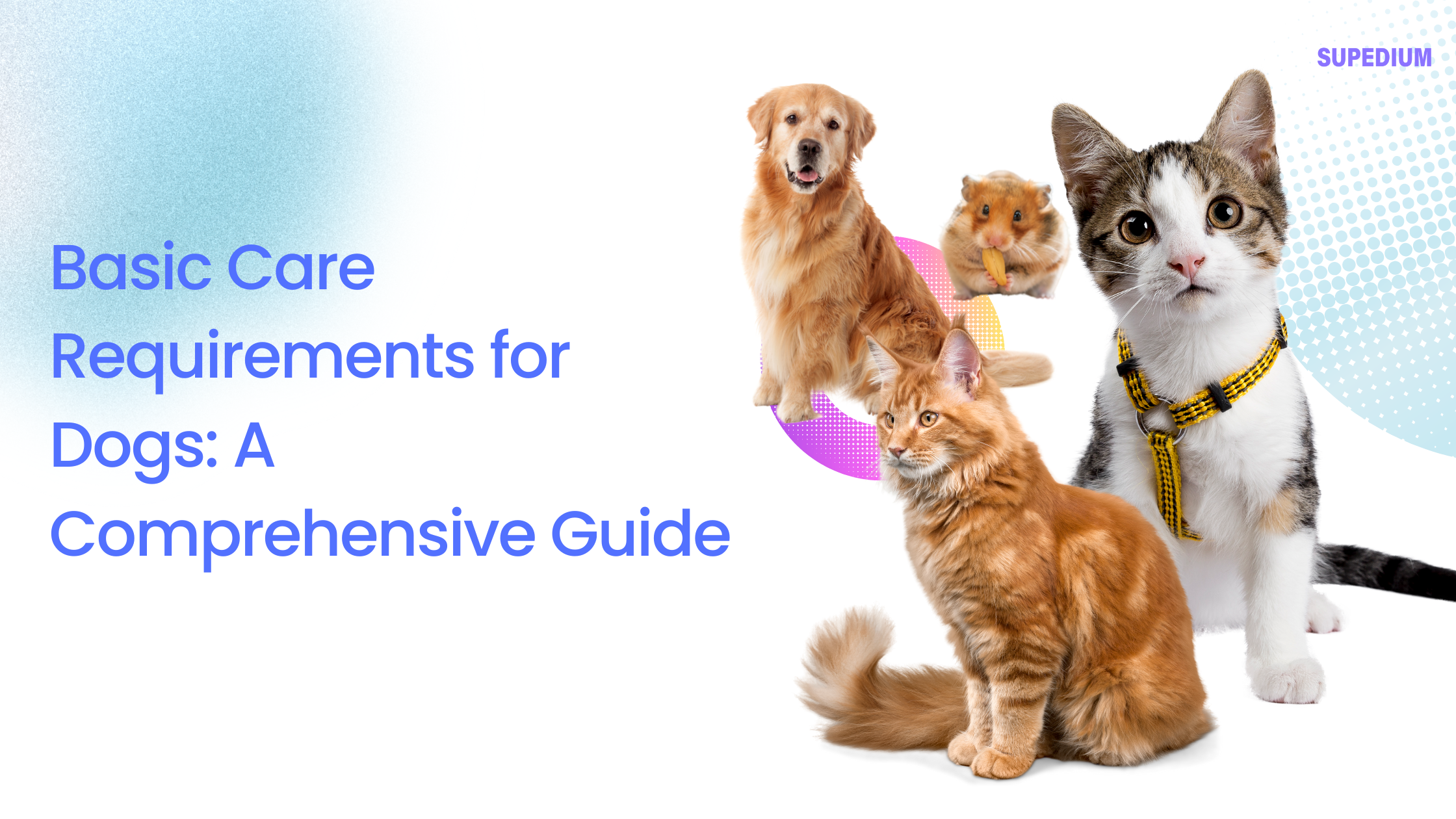Table of Contents
![]()
Ensuring proper care for dogs is essential for their overall health and happiness. From nutrition to grooming, each aspect of dog care plays a crucial role in maintaining their well-being. This comprehensive guide covers the basic care requirements for dogs, offering practical advice for responsible pet ownership.
Nutrition
Choosing the Right Food
Selecting appropriate food for your dog is fundamental. Dogs require a balanced diet tailored to their specific needs. The main types of dog food include dry kibble, wet food, raw diets, and home-cooked meals. Each type has its benefits and drawbacks:
- Dry Food: Convenient and helps maintain dental health by reducing tartar buildup.
- Wet Food: Often more palatable and can aid in hydration.
- Raw Diet: Mimics a natural diet but requires careful handling and balancing.
- Home-Cooked Meals: Allows for control over ingredients but needs to be properly balanced.
When choosing dog food, always read labels carefully to understand the ingredients and nutritional content. Look for high-quality proteins, healthy fats, and essential vitamins and minerals.
Feeding Guidelines
The amount of food a dog needs depends on factors such as age, weight, breed, and activity level. Puppies generally require more frequent feeding than adult dogs. As a general guideline:
- Puppies: 3-4 meals per day
- Adult Dogs: 1-2 meals per day
- Senior Dogs: Adjust based on activity level and health status
Measure portions according to the feeding guidelines on the dog food package, and adjust based on your dog’s specific needs.
Special Dietary Needs
Some dogs have unique dietary needs due to age, health conditions, or allergies. Puppies need food that supports growth and development, while senior dogs may require diets lower in calories and higher in joint-supporting nutrients. Dogs with allergies might need specialized diets free from common allergens.
Hydration
Importance of Fresh Water
Access to fresh, clean water is vital for all dogs. Proper hydration supports digestion, regulates body temperature, and maintains overall health. Always ensure your dog has constant access to water.
Ensuring Constant Access
Change the water daily to keep it fresh. During hot weather or after exercise, check water levels more frequently. Signs of dehydration include lethargy, dry gums, and excessive panting.
Exercise and Mental Stimulation
Physical Exercise Requirements
Regular exercise is crucial for maintaining a dog’s physical health and preventing obesity. The amount and type of exercise needed vary by breed, age, and energy level. Most dogs require at least 30 minutes to 1 hour of exercise per day, which can include walks, playtime, and activities like fetch.
Mental Stimulation
Mental stimulation is equally important as physical exercise. Boredom can lead to destructive behaviors. Engage your dog with puzzle toys, interactive games, and training sessions to keep their mind active and stimulated.
Grooming
Brushing
Regular brushing helps keep your dog’s coat clean and free from mats and tangles. The frequency and type of brush needed depend on the dog’s coat type:
- Short Coats: Brush weekly to remove loose hair.
- Long Coats: Brush several times a week to prevent mats and tangles.
Bathing
Bathing frequency varies by breed and lifestyle. Most dogs need a bath every 4-6 weeks. Use a dog-specific shampoo that is gentle on their skin.
Nail Trimming
Trim your dog’s nails regularly to prevent overgrowth and discomfort. Depending on the dog’s activity level, this may be needed every 1-2 weeks. Use proper nail-trimming tools and techniques to avoid cutting too close to the quick.
Ear Cleaning
Check your dog’s ears regularly for signs of infection, such as redness or discharge. Clean ears as needed with a vet-recommended ear cleaner and avoid inserting anything deep into the ear canal.
Dental Care
Oral hygiene is crucial for preventing dental disease. Brush your dog’s teeth regularly with dog-specific toothpaste. Dental chews and toys can also help maintain dental health.
Health Care
Regular Veterinary Check-Ups
Routine veterinary visits are essential for monitoring your dog’s health. Regular check-ups allow for early detection of health issues and ensure that vaccinations and preventive treatments are up-to-date.
Parasite Prevention
Preventing parasites such as fleas, ticks, and worms is vital. Use vet-recommended preventive medications and check your dog regularly for signs of parasites.
Spaying and Neutering
Spaying and neutering can prevent unwanted litters and contribute to overall health. Discuss the benefits and timing with your veterinarian.
Recognizing Signs of Illness
Monitor your dog for changes in behavior, appetite, or energy levels. Common signs of illness include vomiting, diarrhea, coughing, or lethargy. If any concerning symptoms arise, consult your veterinarian promptly.
Training and Socialization
Basic Obedience Training
Training is essential for a well-behaved dog. Basic commands such as “sit,” “stay,” and “come” are fundamental. Use positive reinforcement methods, such as treats and praise, to encourage good behavior.
Socialization
Socializing your dog is crucial for preventing behavioral issues. Expose your dog to various people, animals, and environments to help them become well-adjusted. Start socialization early, but continue throughout their life to reinforce positive behaviors.
Safety and Environment
Creating a Safe Living Space
Ensure your home is safe for your dog by removing hazards and securing dangerous items. Create a comfortable space with a cozy bed and access to fresh water.
Identification
Identification is crucial for lost dogs. Microchipping provides permanent identification, while a collar with an ID tag offers immediate contact information.
Travel Safety
When traveling with your dog, ensure they are safely secured in the car using a crate or harness. Plan ahead for pet-friendly accommodations and consider your dog’s comfort and needs during the journey.
Emotional Well-Being
Building a Strong Bond
Building a strong bond with your dog involves spending quality time together, offering affection, and understanding their needs. Learn to recognize and respond to your dog’s body language and emotions.
Addressing Behavioral Issues
If your dog displays behavioral problems such as anxiety or aggression, seek professional help if needed. Behaviorists and trainers can provide guidance and strategies for addressing these issues.
Conclusion
Proper care for dogs encompasses a range of responsibilities, from providing a balanced diet to ensuring regular veterinary visits. By addressing each aspect of your dog’s care, you contribute to their health, happiness, and overall well-being. Embrace the journey of responsible pet ownership, and your canine companion will thrive in a loving and supportive environment.
Share This





Be the first to comment